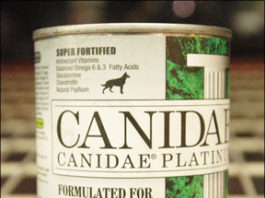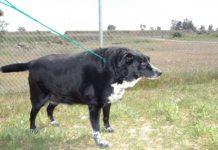Hazards of Hypoglycemia (Low Blood Sugar)
Hypoglycemia is a serious risk factor in diabetes management. Recent studies suggest that approximately 10 percent of diabetic dogs experienced hypoglycemic episodes that required hospitalization. One large survey found that the majority of diabetic dogs presented for hypoglycemia were receiving high doses of insulin (0.7 units or more per pound of body weight).
Your Dog’s Anal Glands and Sacs
Oh, the smell! Anyone who's ever been in the same room when a frightened dog blows" her anal glands or a veterinarian manually expresses them will never forget the malodorous experience. It's wise for dog owners to be aware of the problems that can arise with these glands
Signs That Your Dog is Suffering From Spinal Problems
Maybe your dog's breed is prone to pacing; that's not a concern. But dogs who begin pacing following injury or in their later years may be suffering from spinal problems. In a normal walk pattern, each of the dog's legs move individually in a four-beat gait, with the diagonal pairs of legs moving nearly together. For example, the left hind and the right front legs move forward almost together, with the left hind paw landing a fraction of a second before the right front paw; then the right hind leg goes forward closely followed by the left front.
Can Dogs Get Tetanus?
Fortunately, tetanus is relatively rare in dogs. Horses and humans are more susceptible to tetanus, while cats are highly resistant. Dogs fall somewhere in the middle of this spectrum but it does happen. As an emergency veterinarian, I have personally seen two cases of tetanus in dogs and read of several others.
Treatment for Canine Heartworm Infections
Treatment for a heartworm infection is critical, but it's not without risk. By being prepared for what can happen, you should be able to bring your dog through safely. Whether or not you choose to use conventional heartworm preventatives, there is always the possibility that you may one day find yourself with a heartworm-positive dog, and be faced with the decision of how to treat her.
What To Do If Your Dog Has Worms
Deworming agents are present in any number of prescription and over-the-counter treatments for dogs and puppies. If your dog shows signs of a gastrointestinal worm infestation, there are all sorts of products available that are made exclusively to rid dogs of various types of worms. But there are also deworming agents included whether they are needed or not in many flea and tick treatments and in most heartworm preventive drugs; in fact, it's sometimes hard to find a minimalist flea treatment or heartworm preventive drug that does not contain dewormers. The question is, is this really necessary? Are intestinal parasites that much of an ongoing threat to most dogs and their owners?
Deworming Products and Parasite Control for Dogs
Manufacturers of deworming products have gone out of their way to let us know that, left unchecked, these pesky parasites can plague dogs that are in poor health, rob them of nutrition, attack vital organs, and cause unthriftyness, illness, and even death. If a dog's health is poor and he is hosting an uncontested parasite population, all sorts of bad things can happen. It is important to protect our dogs from parasites, but as it turns out, protection largely follows as a result of building the dog's overall health. Toxic dewormers may be unnecessary to dislodge what few worms a strong and healthy animal might have.
Holistic Care for Dogs with Addison’s Disease
While treatment of Addison's disease focuses on prescription drugs and electrolyte tests, holistic veterinarians add various support therapies to help their patients. Nutrition is the cornerstone of every holistic therapy, and while diet cannot cure Addison's disease, foods made of poor-quality ingredients or diets that lead to nutritional deficiencies are a significant source of stress, and additional stress is just what Addison's dogs don't need. Because wheat, corn, and soy are problem ingredients for some dogs, many holistic veterinarians recommend avoiding them. Some tell their clients to avoid grains altogether.
Hip Dysplasia Surgery Recovery for Dogs
After getting the opinions of three orthopedic specialists and engaging in countless discussions with other owners of dysplastic dogs I made a very difficult decision. I was going to have Sandy undergo a surgery called bilateral femoral head osteotomy (FHO). I knew that I faced challenging post-operative care and rehabilitation, but I assumed that I would do the best I could when the time came.
Canine Pancreatitis
Pancreatitis literally means inflammation of the pancreas, the glandular organ that secretes enzymes needed to digest food. When something causes these enzymes to be activated prematurely, they can actually begin to digest the pancreas itself, resulting in pain and inflammation. Pancreatitis occurs in two different forms, acute and chronic, and both may be either mild or severe. Acute pancreatitis occurs suddenly and is more often severe, while chronic pancreatitis refers to an ongoing inflammation that is usually less severe and may even be subclinical (no recognizable symptoms). Acute pancreatitis can be extremely painful, and can become life-threatening if the inflammation spreads, affecting multiple organs and systems. Symptoms commonly include anorexia (loss of appetite), vomiting, weakness, depression, and abdominal pain. Abdominal pain in a dog may be exhibited as restlessness or not wanting to move; a hunched appearance or a praying position, with the chest down and the rear raised; or vocalization (crying or whimpering). Additional symptoms may include diarrhea, drooling, fever, and collapse.
Understanding The Canine Respiratory System
The respiratory system functions rather miraculously. Vital for life, critical for the health of the whole body, it’s one of the major ways the dog’s body unites his external environment with his inner milieu. As a primary site of contact with the outer world, the lungs are susceptible to diseases that can be caused by any airborne germ, irritant, or toxin that happens to be floating around.
Dog Drooling: The Juicy Truth About Why Dogs Slobber
It is not abnormal for your dog to drool sometimes. Pavlov showed in his famous bell experiments that anticipating a meal can make a dog salivate. Fear can also cause dogs to drool, as you will see in a storm-phobic dog. Drooling is a form of heat control for dogs called evaporative cooling. So, the answer is yes! Drooling can be normal and in response to the dog's emotions or environment.


















